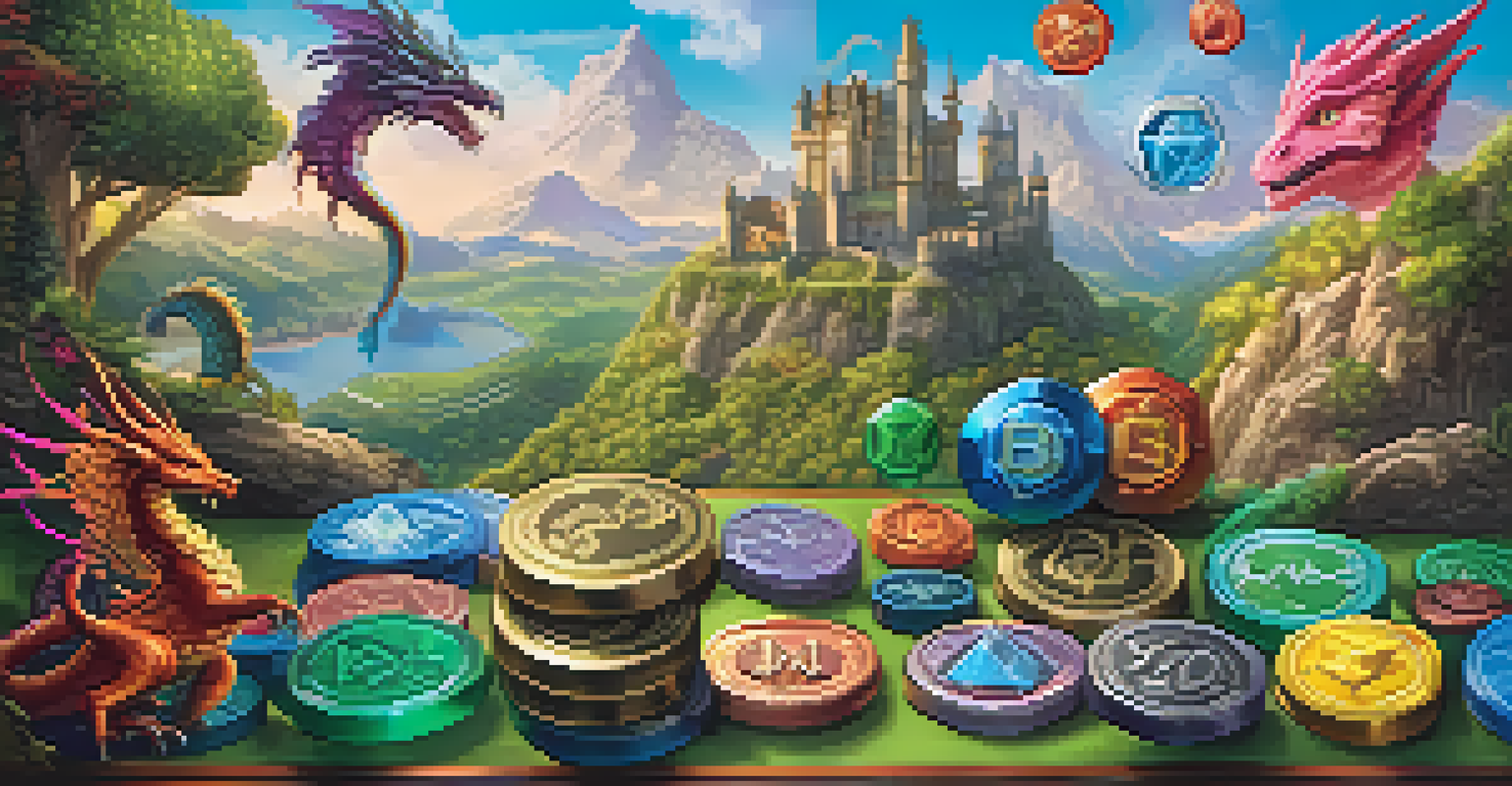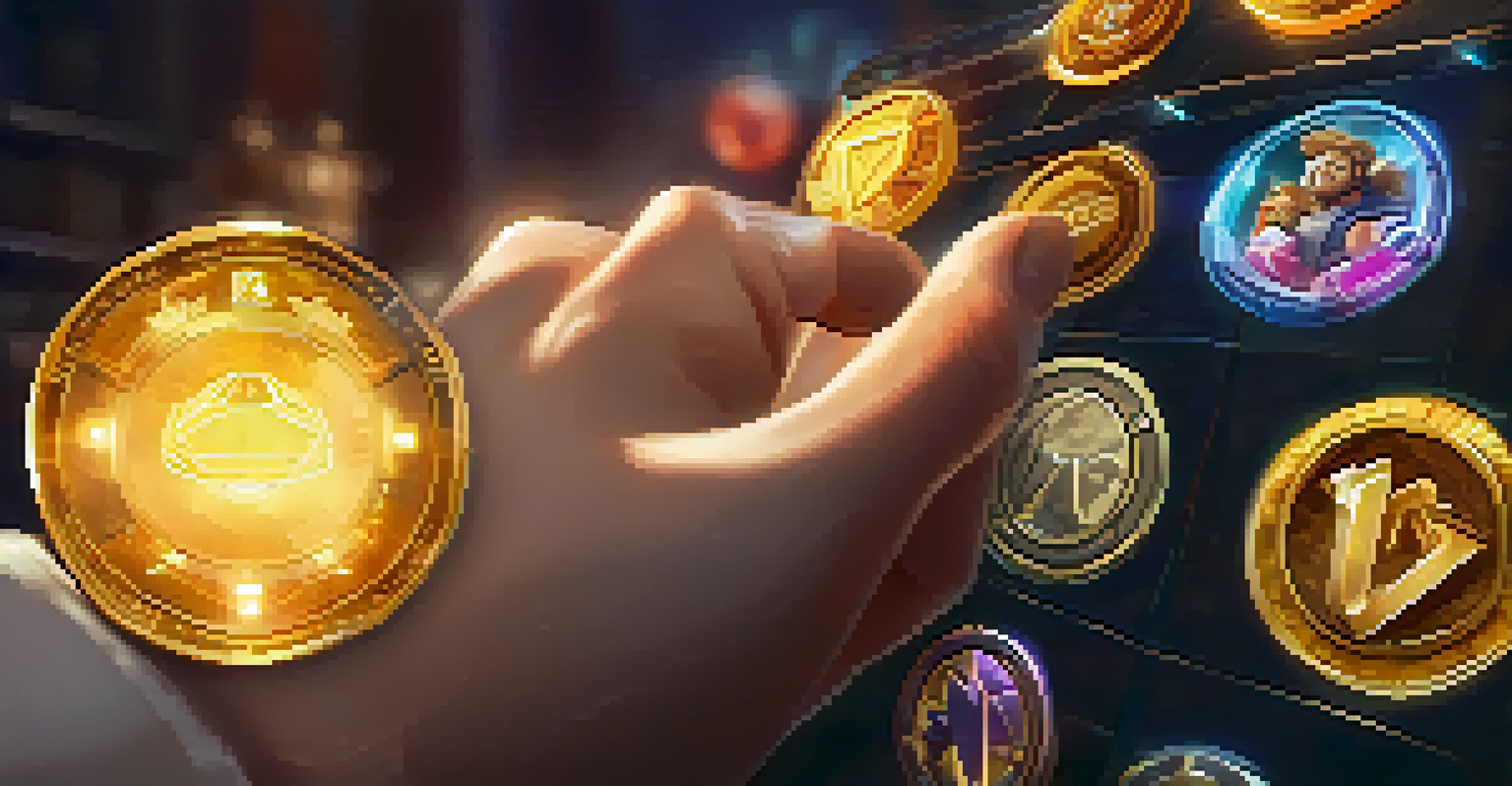Gaming Tokens: The New Currency for Online Gamers

What Are Gaming Tokens and Why Do They Matter?
Gaming tokens are digital assets used within online games, allowing players to purchase in-game items, unlock features, or even trade with others. These tokens serve as a form of currency, similar to how cash works in the physical world. As the gaming industry evolves, the importance of these tokens is becoming increasingly clear, making them essential for both players and developers alike.
In the future, we will see a new gaming economy where players are not just consumers but also stakeholders in the game development process.
Imagine playing your favorite game and having a dedicated currency that lets you buy exclusive skins, weapons, or characters without real money transactions. This convenience not only enhances the gaming experience but also fosters a sense of ownership and investment in the game's universe. Players feel more connected when they can use tokens earned through gameplay rather than relying solely on traditional payment methods.
Moreover, the rise of gaming tokens aligns with the growing trend of play-to-earn models, where players can earn tokens through gameplay and potentially convert them into real-world value. This shift is reshaping how gamers interact with online worlds, creating a new economy that benefits both players and developers.
Types of Gaming Tokens and Their Uses
Gaming tokens can be categorized mainly into two types: utility tokens and security tokens. Utility tokens are used to access in-game services or features, while security tokens represent ownership in a game or its assets. Understanding these distinctions helps players navigate the gaming landscape and make informed decisions about their investments.

For example, a utility token might allow you to buy a special character for a limited-time event, while a security token could grant you a stake in the game's development or profits. This differentiation adds layers of complexity to the gaming economy, appealing to diverse player interests and investment strategies.
Gaming Tokens as Digital Currency
Gaming tokens function like digital currency in online games, allowing players to purchase items and unlock features.
Additionally, some games are integrating non-fungible tokens (NFTs) that let players own unique digital assets, like a one-of-a-kind weapon or artwork. This innovation not only heightens the value of gaming tokens but also creates a vibrant marketplace where players can trade their digital treasures, further enriching their gaming experience.
The Role of Blockchain in Gaming Tokens
Blockchain technology underpins many gaming tokens, ensuring transparency and security in transactions. By using a decentralized ledger, players can trust that their tokens are authentic and that trades are secure. This builds a sense of community and reliability in the gaming ecosystem, which is crucial for long-term engagement.
Blockchain technology has the potential to revolutionize gaming by providing players with true ownership of their digital assets.
Moreover, blockchain allows for the creation of smart contracts, which automate transactions between players and developers. For instance, if you buy a rare item using gaming tokens, a smart contract can instantly verify the transaction, transferring ownership without the need for intermediaries. This efficiency enhances the user experience and streamlines the gaming economy.
As more games integrate blockchain, the possibilities for gaming tokens expand. Players can expect a future where their gaming assets have real-world value, creating a bridge between virtual and tangible economies that benefits everyone involved.
How Gaming Tokens Enhance Player Engagement
One of the most significant advantages of gaming tokens is their ability to boost player engagement. When players can earn tokens through their achievements, it encourages them to invest time and effort into the game. This gamification of earning creates a rewarding experience that keeps players coming back for more.
Consider a game where players can earn tokens by completing challenges or participating in events. This not only motivates players to improve their skills but also fosters a sense of community as they share strategies and compete for rewards. The more engaged players are, the more likely they are to invite friends, expanding the game's reach.
Blockchain Ensures Security
Blockchain technology provides transparency and security for gaming tokens, enhancing trust in transactions.
Additionally, the ability to trade or sell tokens can lead to a thriving player-driven economy. This dynamic environment not only enhances the gaming experience but also empowers players, giving them a stake in the game's success and longevity.
The Challenges Facing Gaming Tokens
Despite the benefits, gaming tokens also face several challenges that could impact their adoption. One major concern is the potential for market volatility, where the value of tokens can fluctuate dramatically based on supply and demand. This unpredictability can deter new players and create uncertainty within the gaming community.
Another challenge is regulatory scrutiny, as governments around the world are still figuring out how to classify and regulate digital currencies. This uncertainty can lead to hesitation from developers and investors alike, impacting the growth of gaming tokens. Clear regulations are essential for fostering a stable environment where players can confidently engage with these new currencies.
Lastly, there’s the risk of scams and fraud in the unregulated token space. Players must be cautious and do their research to avoid falling victim to dishonest practices. As the gaming community becomes more educated about these risks, developers must prioritize transparency and security to build trust among players.
The Future of Gaming Tokens: Trends to Watch
As the gaming industry continues to evolve, several trends related to gaming tokens are emerging. One notable trend is the increasing integration of virtual reality (VR) and augmented reality (AR) into gaming experiences. This technology could create new ways for players to earn and spend tokens, further blurring the lines between reality and the gaming world.
Additionally, the popularity of esports is skyrocketing, and gaming tokens could play a significant role in this arena. As professional gaming continues to gain traction, we may see tokens used for betting, sponsorships, and prize distributions, enhancing engagement for both players and fans.
Challenges and Future Trends
Despite potential benefits, gaming tokens face challenges like market volatility and regulatory scrutiny, but trends like VR integration and esports growth could shape their future.
Finally, expect to see more collaborations between game developers and financial institutions, leading to innovative solutions for token management. This partnership could help stabilize token markets and provide players with more options for using their tokens in the real world, making them a viable alternative to traditional currencies.
Conclusion: Embracing the Change in Gaming Economy
In summary, gaming tokens are reshaping the landscape of online gaming, providing players with new opportunities for engagement and investment. By understanding the types of tokens, the role of blockchain, and the future trends, players can navigate this exciting new economy with confidence. As gaming tokens continue to evolve, they promise to create a more immersive and rewarding experience for gamers.
While challenges exist, the potential benefits of adopting gaming tokens are significant. They not only enhance player engagement but also create a vibrant economy where players can thrive. As we embrace these changes, it’s crucial for both players and developers to stay informed and adapt to the shifting landscape.

Ultimately, gaming tokens represent a new frontier in the gaming industry, blending entertainment with economic opportunity. For those willing to dive into this evolving space, the rewards could be well worth the journey.